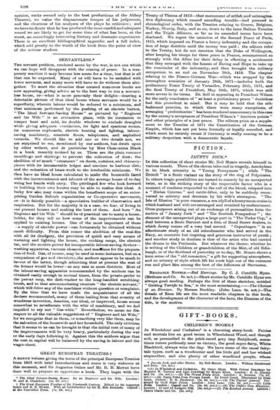SERVANTLE SS.*
Tire servant problem, rendered acute by the war, is not one which we can hope will disappear with the coming of peace. In a tem- porary reaction it may become less acute for a time, but that is all that can be expected. Many of us will have to be satisfied with fewer servants, and many more will have to do without them alto- gether. To meet the situation thus created numerous books are now appearing, giving advice as to the best way to run a servant- leas house, or—what is more generally their delight—drawing a delectable picture of that ideal house where servants would be a superfluity, wherein labour would be reduced to a minimum, and that minimum performed by the pushing of an electric button. "The Ideal Servant-Saving House" as pictured by "Engineer and his Wife" is an attractive place, with its insulation to temper heat and cold, its double windows to exclude draughts while giving adequate ventilation, its light and spacious rooms, its numerous cupboards, electric heating and lighting, labour- saving machinery, concrete floors, telephones, and asphalted veranda. We should like to add one or two details not, we are surprised to see, mentioned by our authors, but dwelt upon by other writers, and in particular by Miss Clementine Black in a book recently noticed by us. These are the plain concave mouldings and skirt;ngs to prevent the collection of dust ; the abolition of sci much " ornament " on dome, cornices, and chimney- pieces with its innumerable ledges and crevices to harbour dirt ; and the reduction of brass-work to the irreducible minimum. We then have an Ideal house calculated to stake the houeewifo faced with the inconveniences and labours of the average house of to-day wring her hands with envy. The privileged few who look forward to building their own houses may be able to realize this ideal. A lucky few also may come within the beneficent scope of an enter- prising Garden Suburb organization or Co-operative movement, or—it is faintly possible—a speculative builder of observation and inspiration. But for the majority it is a case, we fear, of living in our present houses and making the best of them. And here "An Engineer and his Wile" should be of practical use to many a house_ holder, for they tell us how some of the improvements can be applied to existing houses. One of the most important of these --a supply of electric power—can fortunately be obtained without much difficulty. From this comes the abolition of the coal-fire with all its drudgery, the provision of quick and easy means of warming and lighting the house, the cooking range, the electrio fan, and the motive-power for innumerable labour-saving devices— washing apparatus, vacuum cleaners, and machines for the prepara- tion of food. Gas, of course, may be used in some instances, but on a comparison of gas red electricity, the authors appear to be much in favour of the latter, though admitting that at present the cost of the former would be lower—at any rate in most districts. Most of the labour-saving apparatus recommended by the authors can be obtained easily enough in normal times, from the potato-peeler to the patent mop, the dish-washer to the long-handled scrubbing- brush, and to that accommodating creature " the electric servant," which will drive any of the machines without question or complaint. By the time that we have made the acquaintance of all the devices recommended, many of them hailing from that country of wondrous invention, America, our ideal, or improved, house seems somewhat to reverberate with the whir of machinery, and we feel impelled to cry out "Gee-whiz." Nevertheless, we mean no dis- respect to all the valuable suggestions of "Engineer and his Wife," for we recognize that in them, or something very like them, may lie the salvation of the housewife and her household. The only criticiam that it seems to us can be brought is that the initial cost of many of the improvements will be very heavy, particularly during the war or the early days following it. Against this the authors argue that the wet in capital will be balanced by the saving in labour and the wages-sheet.






































 Previous page
Previous page